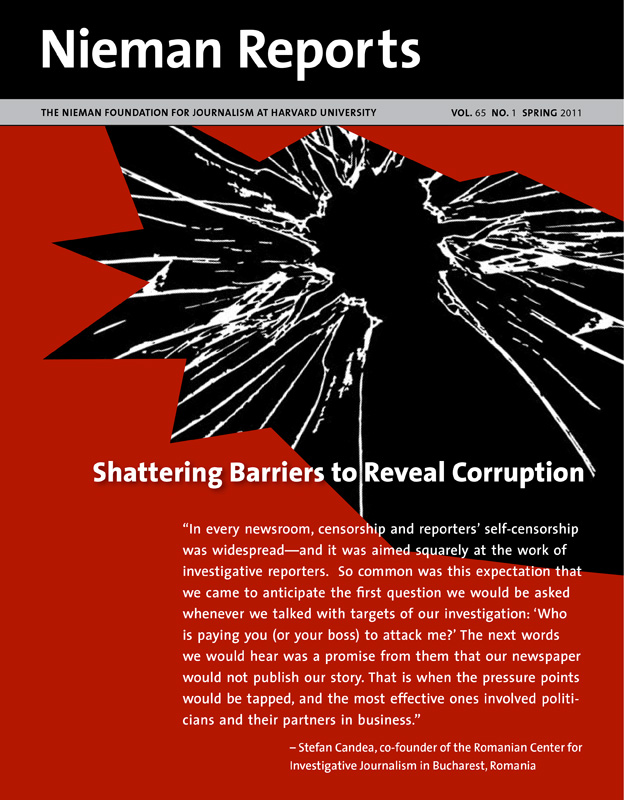Exposing corruption in countries where the rule of law has not been established is always a heavily one-sided affair. Independent media and the Internet are the tools that citizens have to fight against it while the ruling elite retains the power of the state’s resources and commands the loyalty of those who enforce punishment on those who interfere. Today in Russia journalists need help in their fight against corruption. We don’t want intrusive assistance, but rather moral and professional support from our international colleagues (journalists and bloggers) along with attentiveness on the part of international investors.
RELATED ARTICLE
“Costs That Investors Seem Willing to Ignore”
– Alexei Navalny and Maxim TrudolyubovCore values of transparency and accountability on a corporate and a state level are critical in our struggle against corrupt practices. We have been promoting these values through our work at Vedomosti (“The Record”), a Russian business daily based in Moscow and at the blog navalny.livejournal.com. Still, contending with bureaucracies and companies in countries known for high levels of corruption is tricky. To outsiders, our efforts might appear futile, even impossible. Corruption, some say, is an internal issue and it is inevitable in countries that are moving from state-run to market-driven systems.
RELATED ARTICLE
“Kickbacks: The Margin Is Growing”
– Alexei Navalny and Maxim TrudolyubovBut corruption is not just a pile of rocks placed in our way while we head down the road toward something different. It involves crimes that thwart the progress of entire societies; in Russia the consequences of widespread corrupt practices are disastrous. According to the Russian think tank Indem, Russia’s corrupt officials pocket $300 billion a year—close to 20 percent of the country’s gross domestic product. This past November President Dmitry Medvedev acknowledged that up to $33 billion is stolen annually through the state procurement system alone. The corruption index that is produced by Transparency International ranks Russia as 154 (out of 178 countries), below Pakistan, ahead of Venezuela, and tied with nine other countries in terms of public sector corruption.

Sergei Magnitsky, a Russian lawyer who is believed to have discovered a major tax fraud involving police officers, was subsequently arrested on charges of tax evasion and died in pretrial detention in 2009. Photo by Alexander Zemlianichenko/The Associated Press.
Corruption is not just theft. It leads to moral and physical suffering and the destruction of people. Thousands in Russia are serving prison terms on charges cooked up by those who took their businesses away or needed to get rid of witnesses. Sergei Magnitsky, a Russian lawyer who worked in the Moscow office of Firestone Duncan, a legal, tax, accounting and audit company, is believed to have uncovered one of the biggest tax frauds perpetrated by a gang of police officers. He was arrested on charges of tax evasion and after 11 months of imprisonment, during which he was denied proper medical treatment, he died in pretrial detention.
RELATED LINK
Resources for Investigative ReportersCorruption is not really an internal issue either. Rather, it is a continuous flow of funds from source countries, such as Russia, to haven countries, such as the United Kingdom, Switzerland, the United States, and many others. This flow would not be possible without indirect support from banks, corporations or even some Western officials. Often, neither international investors nor partners of Russian companies notice the cost and expense anomalies that occur on the Russian side of the border.
RELATED ARTICLE
“Russia: Corruption Isn’t Only a Threat to the System—It Is the System”
– Fatima TlisovaPipeline construction provides a good example; pipelines built for the Russian energy company Gazprom routinely cost three times more than ones made for similar European companies. An internal investigation at Transneft, the state-controlled Russian pipeline monopoly, submitted to the Audit Chamber of Russia estimated that up to $4 billion had been embezzled by a company officer through overcharging and violations of normal business practices during construction of the East Siberia-Pacific Ocean pipeline (ESPO). When one of the report’s writers made a copy of it publicly available, heated discussion began in Russia, and there were expectations that authorities should act. Subsequently, the audit chamber classified the report and refused to confirm the allegations. It is well worth noting that Transneft’s international auditor is a Big Four accounting firm and Transneft has also issued bonds on international markets with major U.S. banks underwriting them. Neither the auditing firm nor the banks have blown the whistle on these practices.
Corruption in faraway places is actually not that far away. The proceeds find their way to banks in countries throughout the world; they are invested in real estate that could be next door or in another country’s sports teams. Corruption’s reach is global, and thus remedies must be global in their reach, too.
There are plenty of corrupt practices that are ripe for journalists to investigate—and the roots of these stories can be found in countries throughout the world. In fact, foreign banks, real estate agents, and fund managers keep Russia’s biggest secrets, and ill-gotten gains are being siphoned out of Russia into the West at an ever escalating pace. Companies from countries where corruption seems possible leave massive footprints in the West. We suggest that our colleagues research these companies carefully—keeping a watchful eye on any irregularities. Questions should be asked and, if necessary, legal action can be taken.

Business reporters and shareholders in companies from countries with high levels of corruption should pay close attention to the way large Russian state-controlled companies are run and take a bolder stance against these pernicious practices. Leading American pension funds and mutual funds are shareholders, giving them the right to receive an explanation about the inexplicable costs and expenses that inevitably affect financial results. Shareholders should be encouraged to send their queries directly to the Russian prosecutor’s office, investigative department, and the police.
There are policies that should be put in place, including ones we list below. If enacted, these approaches to increased transparency would help to open up paths to cover corruption:
- Corporate governance in international projects should be addressed
- Information disclosure standards on international exchanges need to be toughened
- Tougher professional standards are needed for auditors and consultants who are responsible for reviewing and reporting on companies suspected of corruption for international investors
- Environmental security is examined whenever international agreements on large infrastructure projects are pursued. Consider “corruption security” in a similar way since big-time stealing defrauds societies of resources just as harm is inflicted on the environment.
Of course, investment is a private affair. But the practices of businesses in which investments are made are no longer regarded as being value-neutral. Many nations have laws in place that criminalize, for example, bribes of foreign officials; one example is the Foreign Corrupt Practices Act in the United States. And in many countries public opinion no longer tolerates corruption involving political leaders.
While journalists and bloggers in Russia risk their lives to reveal corrupt practices, there are ways that those living in free and lawful societies can aid their efforts. In our global economy, neither borders nor jurisdictions protect anyone from the destructive effects of corruption. Journalists can provide powerful voices, but if their voices aren’t joined by others then it is likely that corrupt practices will escalate, not diminish.
Alexei Navalny is a Russian lawyer, popular blogger, and a prominent anti-corruption campaigner. Maxim Trudolyubov, a 2011 Nieman Fellow, is editorial page editor of Vedomosti, a Russian business daily.



